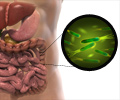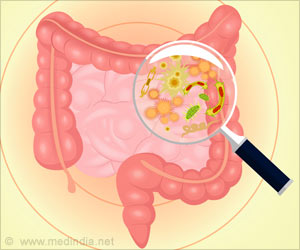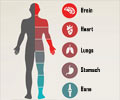Gut microbes play a vital role in regulating stress responses around the clock.

- New research from reveals that the gut microbiome regulates the body’s diurnal (day-night) rhythms in stress hormones.
- Depletion of gut microbiota results in disruptions in the brain’s core circadian system, and is associated with altered stress hormone rhythms.
- The research highlights that gut microbes also regulates key stress-responding brain regions throughout the day.
- Using microbe transplantation, the team confirmed that oscillations of gut microbes across the day are critical for regulating stress hormone secretion.
‘Gut Microbes in Action: Lactobacillus strain (Limosilactobacillus reuteri) syncs stress with your circadian rhythm. #GutMicrobes #Stress #circadianrhythm #medindia’





This breakthrough research from University College Cork and APC Microbiome Ireland - a Research Ireland Centre - offers compelling evidence that the trillions of microorganisms in the gut orchestrate the body’s hormonal responses to stress in a time-dependent manner, paving the way for new therapeutic approaches targeting the gut-brain axis. Published in Cell Metabolism, this study shines a spotlight on the intricate relationship between the gut microbiota and the hypothalamic-pituitary-adrenal (HPA) axis, the body’s central stress response system. The research demonstrates that depletion of gut microbiota leads to an hyperactivation of the HPA-axis in a time-of-day specific manner, which alongside with alterations to the brain’s stress and circadian responding regions, results in altered stress responsivity across the day (1✔ ✔Trusted Source
Gut microbiota regulates stress responsivity via the circadian system
Go to source).
Limosilactobacillus reuteri: The Key Influencer of the Circadian-Regulated Stress Mechanism
The study further identifies specific gut bacteria, including a Lactobacillus strain (Limosilactobacillus reuteri), as key influencers of this circadian-regulated stress mechanism. L. reuteri emerged as a candidate strain that modulates glucocorticoid secretion (stress hormones), linking the microbiota’s natural diurnal oscillations with altered stress responsiveness.This groundbreaking discovery opens up new possibilities for psychobiotic interventions aimed at improving mental health outcomes by targeting gut bacteria that influence stress regulation.
Gut Microbes: The Unsung Hero in Stress Regulation
With modern lifestyles increasingly disrupting circadian rhythms through irregular sleep patterns, high stress, and poor diet, this research underscores the importance of the gut microbiota in maintaining the body’s natural stress-regulation processes.Advertisement
First author Dr. Gabriel Tofani added “Our findings underscore the importance of not only the gut microbiota composition, but also how gut microbes change across the day. By showing that gut bacteria influence how the body handles stress throughout the day, we’re helping to understand the mechanisms through which the microbiota shapes our responses to the environment around us. Our work also demonstrates that exploring this relationship between the gut microbiota and circadian rhythms will be key in the development of microbiota based therapies for the stress-related disorders in the future”.
The study was conducted at APC, a global leader in microbiome research based at University College Cork. Professor Cryan's team has long been at the forefront of gut-brain axis research, and this new discovery adds to the growing body of evidence that gut bacteria have far-reaching effects on mental and physical health.
Reference:
- Gut microbiota regulates stress responsivity via the circadian system - (https://www.cell.com/cell-metabolism/fulltext/S1550-4131(24)00399-1)
Source-Eurekalert














